How Nicola Sturgeon has carved out a role at COP26
- Published
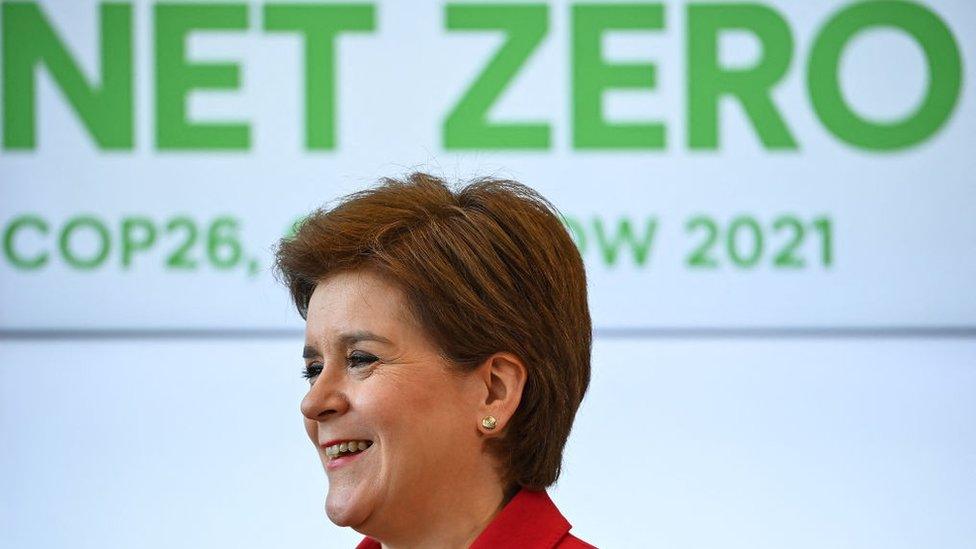
There was a time when Boris Johnson seemed determined to exclude Nicola Sturgeon from COP26.
At his party's 2019 conference he told Scottish Conservatives that he did not want Scotland's first minister "anywhere near it", external.
That would have been hard to achieve given the UK is hosting the UN climate summit in Ms Sturgeon's home city.
In any event the prime minister relented, telling the BBC in August that all devolved leaders would have a big role to play.
Exactly what their role is has never been formally spelled out by Mr Johnson.
Ms Sturgeon was not afforded a speaking slot on the main conference platform during the first week.
The only SNP politician to be given that honour was Glasgow City Council leader Susan Aitken, who gave the civic welcome.
Allow X content?
This article contains content provided by X. We ask for your permission before anything is loaded, as they may be using cookies and other technologies. You may want to read X’s cookie policy, external and privacy policy, external before accepting. To view this content choose ‘accept and continue’.
That changes this week, with Ms Sturgeon speaking on gender and climate change and chairing a panel discussion on the same topic.
But the first minister has managed to carve out roles for herself and achieve prominence without top billing.
She's been photographed with everyone from US President Joe Biden and Germany's Angela Merkel to climate activists Greta Thunberg, Vanessa Nakate and Al Gore.
Ms Sturgeon's spoken at Cop26 fringe events on offshore wind, climate justice and female leadership and given interviews to media outlets from Vogue magazine - where she talked about life after politics, external - to CNN.
If she has half an eye on a new job beyond Holyrood, COP26 has given her the greatest networking opportunity in the world.
As European co-chair of the Under2 Coalition of 260 devolved governments, regions and cities acting together on climate, she is promoting their pledge to achieve net zero by at least 2050.
There have also been some formal meetings, external with leaders from developing countries like Malawi and Bangladesh.
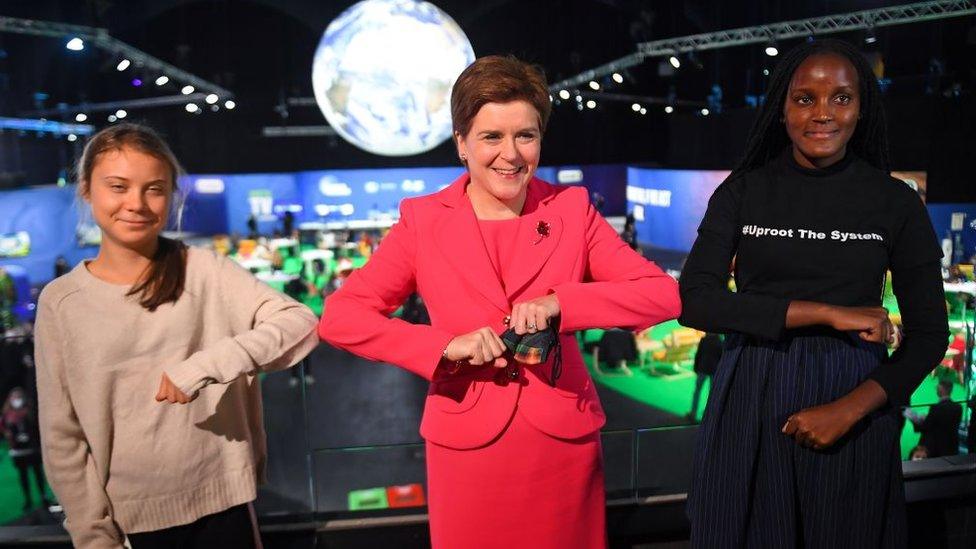
Nicola Sturgeon has been pictured meeting activists like Greta Thunberg and Vanessa Nakate as well as world leaders
Whisper it but there has actually been a notable degree of cooperation between the UK and Scottish governments. Not the fullest partnership perhaps, but an accommodation.
There always had to be, given the Scottish government has responsibility for policing and public health.
Ministers from Edinburgh and London have toned down their mutual hostility over independence and much else to present a more united front on tackling global warming.
The SNP riled their UK-supporting opponents by publishing adverts welcoming delegates to "a nation in waiting". The first minister also accused the UK government of "classic corruption" over its handling of the Owen Paterson affair - but beyond that there has been a relative truce.
Boris Johnson and Nicola Sturgeon appeared together at a breakfast event attended by an array of world leaders.
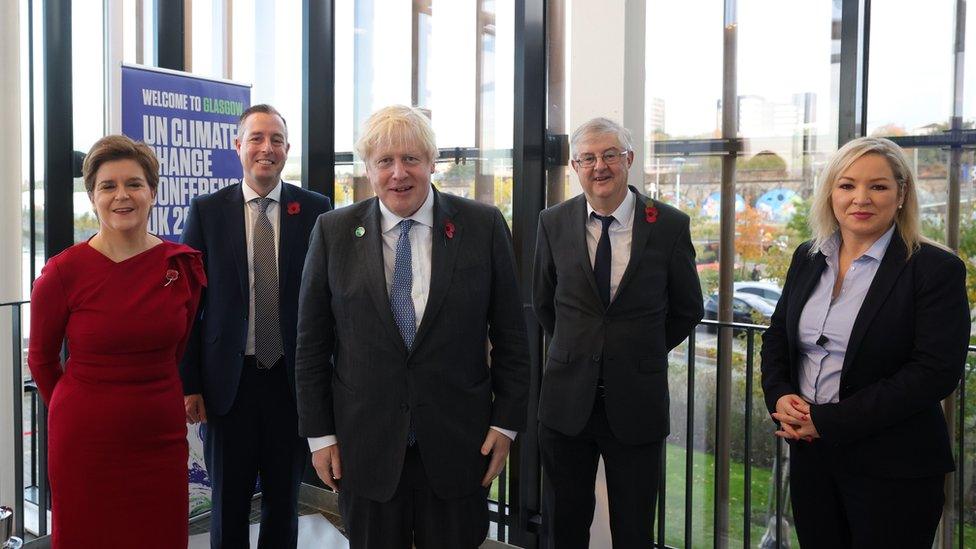
Boris Johnson and Nicola Sturgeon are not normally close, but appeared together at a breakfast event alongside other devolved leaders
The first minister also joined COP President, Alok Sharma and UN climate chief Patricia Espinosa to receive written demands for climate action from young people around the world.
The truth is the UK and Scottish governments have a shared interest in making the Glasgow summit as successful as possible.
Nicola Sturgeon may not be a party to the negotiations but she is actively advocating the outcomes the UK and UN are seeking.
The Scottish government has won international recognition for its contribution to tackling global warming from, among others, the UN secretary general, Antonio Guterres.
In a BBC interview, he expressed appreciation for the Holyrood administration being among the first "international actors" to allocate funds to developing countries for loss and damage caused by the effects of climate change.
UN chief hopes Glasgow can solve 'serious problems'
Mr Guterres also praised the Scottish government's very clear target of achieving net zero before 2050.
Hitting net zero by 2045 is a legal requirement in Scotland, with an interim target of a 75% reduction in carbon emissions (compared to 1990 levels) by 2030.
The snag is the Scottish government has missed the annual targets it needs to hit to achieve the 2030 outcome in each of the last three years.
Scotland's emissions were down by 51.5% by 2019 - short of the 55% target for that year. A catch up plan has been put in place.
The 2030 target has been described as "enormously challenging" by Chris Stark, chief executive of the UK's official watchdog, the Climate Change Committee.
He told BBC Scotland's No Hot Air podcast that he had not seen a strategy that would deliver it, that there was a danger it had been "overcooked".
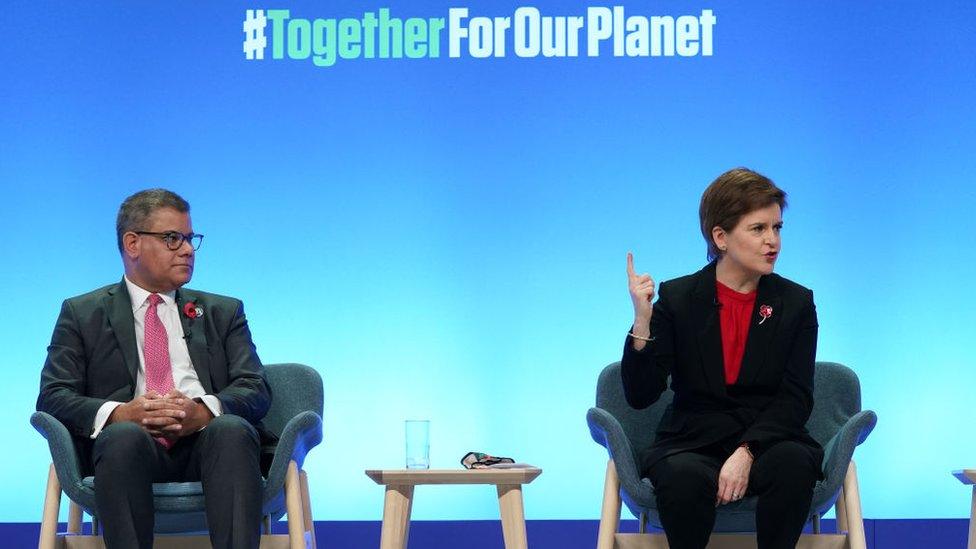
Nicola Sturgeon told me she believes there is a "credible pathway" to delivering what's been promised on climate change.
She argues that it is better to be overly ambitious and fall a bit short than not to push hard on carbon reduction.
A key part of the Scottish government's plan is to use carbon capture and storage technology to divert emissions that would otherwise be released into the atmosphere.
That strategy suffered a setback last month when the UK government decided not to prioritise a Scottish carbon capture cluster including the Acorn project at St Fergus.
Ms Sturgeon has written to the prime minister, external asking him to reconsider not least because the UK is counting on Scotland's contribution to hit its own net zero targets.
Perhaps the biggest Scottish success story is the decarbonisation of electricity production, with almost all of Scotland's domestic demand now produced from renewable sources.
The US interior secretary, Deb Haaland has noted that "Scotland has led in creating a clean energy economy".
Allow X content?
This article contains content provided by X. We ask for your permission before anything is loaded, as they may be using cookies and other technologies. You may want to read X’s cookie policy, external and privacy policy, external before accepting. To view this content choose ‘accept and continue’.
What that observation glosses over is what campaigners describe as 'the elephant in the room' - the continued extraction of oil and gas.
It is a major Scottish industry supporting about 100,000 jobs.
New fields are under consideration with the Scotland secretary in the UK government, Alister Jack offering his 100% backing for the controversial Cambo field, west of Shetland.
Until very recently, SNP ministers might have been expected to offer similar encouragement. The party has a long history of championing oil and gas.
Just before the 2017 general election, Nicola Sturgeon told an oil industry conference, external that the North Sea still contained 20 billion barrels, and that the "primary aim is to maximise economic recovery of those reserves".
A couple of years later the first minister declared a "climate emergency" and in the lead up to COP26 ditched the mantra of maximum economic recovery, external on environmental grounds.
This followed the SNP negotiating a new power-sharing partnership with the Scottish Greens.
A new energy strategy is to be produced that prioritises the fastest possible transition out of oil and gas, while keeping the lights on and replacing lost jobs.
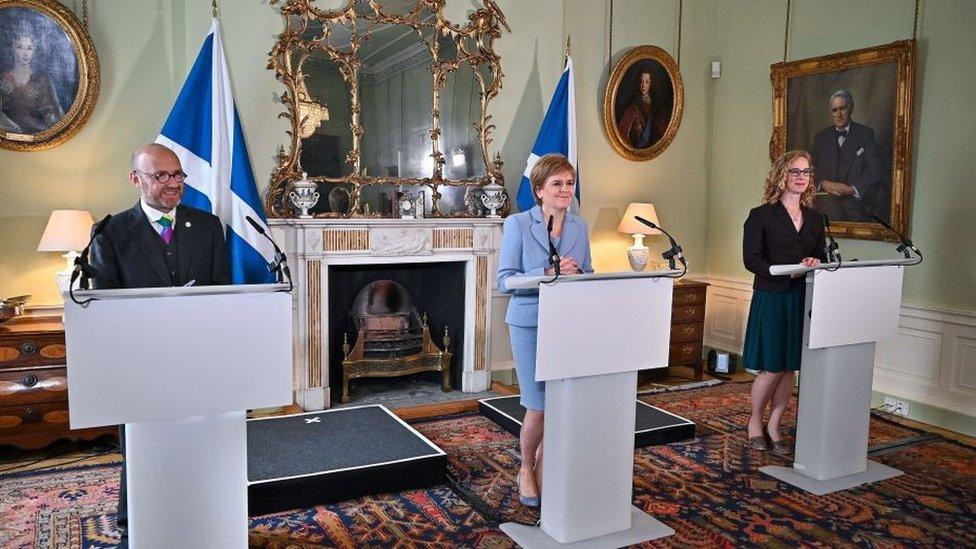
The co-leaders of the Scottish Greens have joined Nicola Sturgeon's government
The policy shift that is under way is quite profound. However, it does not include immediate opposition to new oil and gas.
Indeed Scotland's net zero secretary Michael Matheson has not ruled out issuing new drilling licences, external in the event of Scottish independence.
Ms Sturgeon has said that the UK authorities, who currently decide, should reassess Cambo - applying strict new climate tests she thinks it would struggle to pass.
She has stopped short of opposing it outright, drawing criticism from Greenpeace and Friends of the Earth.
Boris Johnson has said that contracts for a project like Cambo that's been in the development pipeline for 20 years cannot simply be torn up.
The UK government is proposing climate compatibility tests for wholly new exploration licences.
The Cambo controversy has raised questions about the UK's commitment to achieving net zero by 2050, but ministers insist the impact of oil and gas is priced in to their calculations.
Both the UK and Scottish governments consider themselves world leaders in decarbonisation, but that does not mean they're getting everything right.
Close scrutiny of their records on climate action comes with their privilege of welcoming the world to Glasgow for COP26.

The COP26 global climate summit in Glasgow in November is seen as crucial if climate change is to be brought under control. Almost 200 countries are being asked for their plans to cut emissions, and it could lead to major changes to our everyday lives.
